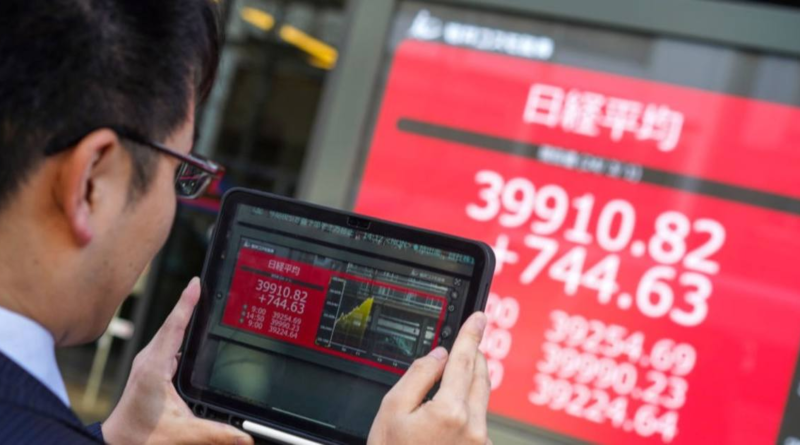Japan's once-overlooked chip sector suppliers drive Nikkei rally – Nikkei Asia
Competitive advantage in chipmaking equipment and materials pays off
TOKYO — The Nikkei Stock Average’s record-making rally approached the 40,000 milestone on Friday, buoyed by the strong performance of Japan’s previously unnoticed gems in the global semiconductor industry.
Chipmaking equipment manufacturer Tokyo Electron climbed 5% at one point to touch a new record high. This followed the rises by American chip companies Nvidia and AMD in the U.S. market on Thursday.
The Tokyo market is benefiting from its high concentration of semiconductor stocks, with the Nikkei average climbing 25% between the end of September 2023 and Friday.
This rise outpaced those by Taiwan’s TWSE Capitalization Weighted Stock Index (Taiex), South Korea’s KOSPI index and the Nasdaq Composite during the same period.
February daily turnover averaged 5.16 trillion yen ($34.3 billion) on the Tokyo Stock Exchange’s Prime market, rising 19% from January to reach an all-time high. Semiconductor-related companies are among the most heavily traded stocks.
This rally has been spurred by global investors who have turned their eyes to Japan’s industrial base supporting the semiconductor boom.
“Those looking for the next Magnificent Seven that drove the high-tech market are more likely to take notice” of Japan, said Daiju Aoki of UBS SuMi Trust Wealth Management.
Japan’s semiconductor industry has lost ground in terms of chip design and manufacturing but remains highly competitive in chipmaking equipment and materials.
Japan commands the top share in chipmaking materials at 48%, according to Japan’s Ministry of Economy, Trade and Industry. Taiwan comes in a distant second at 16%. Japan has a 31% share in chipmaking equipment — a close second to the 35% of the U.S.
Japanese technology that can handle intricate processes is key to producing advanced semiconductor devices for artificial intelligence. And investors are taking notice. Towa, a maker of chipmaking equipment, closed up 12% from the day before.
Towa has a 60% share in resin-sealing equipment for semiconductors. Demand is growing for high-precision and efficient devices that seal and integrate multiple chips amid the generative AI boom.
The devices are also in high demand for producing next-generation memory for AI. “We expect to receive orders for 15 to 20 units from South Korean chipmakers in the fiscal year ending March 2024,” Towa President Hirokazu Okada said.
Nomura Micro Science rose 5% in intraday trading Friday, touching an all-time high for a fourth straight day. The company makes equipment that purifies water for chipmaking.
Chipmaking materials makers Shin-Etsu Chemical and Hoya have also been improving their product lineups.
“AI demand has provided a tailwind to Japanese materials makers because there are many companies that are strong in high-end materials that are in demand due to generative AI,” said Go Miyamoto, senior analyst at SMBC Nikko Securities.
Japan is also being recognized as an alternative host for manufacturing capacity as companies diversify production bases.
Taiwan Semiconductor Manufacturing Co. is building facilities in Kumamoto prefecture. And Japan’s new state-backed semiconductor company, Rapidus, has teamed up with IBM with a goal of making cutting-edge chips at home.
While Japan’s semiconductor sector is benefiting from the generative AI boom, the rapid surges in stock prices have raised concern.
Advantest, which produces chip-testing equipment, now has a price-earnings ratio of 81 based on this fiscal year’s projected results. This multiple is nearly twice the last peak over the past decade.
Advantest’s P/E ratio comes to 36 based on market projections for the fiscal year ending March 2026, meaning that investors are snapping up its shares assuming large profit increases over several years.
The bullish buying has spread to midcap companies as well. The stock price of Japan Electronic Materials, which makes probe cards for testing wafers, has risen about 60% since the end of 2023. This has come even with net profit forecast to shrink 85% in the fiscal year ending this March.
“It’s still unknown how far generative AI will spread, so we cannot necessarily say that [the stocks] are overvalued,” said Hidematsu Take, CEO of Epic Partners Investments.
On the other hand, “I think the trend is sensible compared to the dot-com bubble period, but excessively concentrated buying is concerning,” said Takuya Yamada, an executive officer at PayPay Asset Management.
Discover the all new
Nikkei Asia app
Nikkei Asian Review, now known as Nikkei Asia, will be the voice of the Asian Century.
